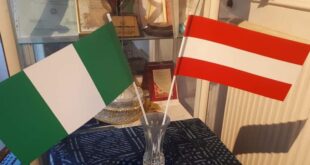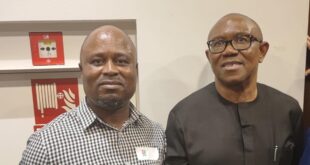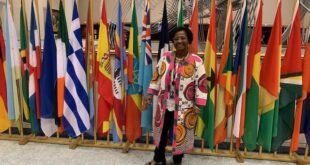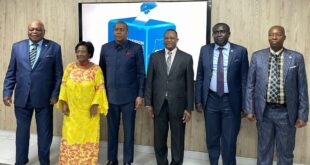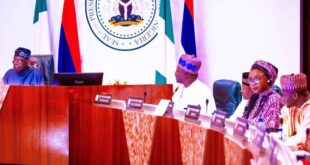Maazi Chukwuma Eze is the National Co-ordinator of Ndi Igbo Germany (NIG). Ndi Igbo means Igbo people, one of the three largest ethnic groups in Nigeria. The businessman, who is the proprietor of EZE Motors and EZE Shipping Service in Hanover, talks about the Nigerian economy, the performance of the one-year old Buhari administration, Igbo self-determination agitations and the situation of Africans in Germany, among other issues.

As a businessman dealing mainly with Nigeria, what is your assessment of the economic situation of Nigeria right now?
Nigeria’s economy is in a freefall. There is uncertainty about the direction in which the economy is going. For example, as an exporter to Nigeria, our activities have been reduced by about 50 per cent by the uncertainty around the exchange rate in Nigeria and the same goes for most companies doing business with the country. That’s a huge loss in revenue to the federal government because it has reduced the revenue it would have generated.
What actions do you think the government has to take to improve the situation?
The government should present its detailed economic policies to the general public. They should let us know where they’re taking the country and how they intend to take us there. In my opinion, that will restore confidence in the market.
Moreover, the budgetary allocations for projects should be released so that money can circulate in order to boost the economy. That will increase consumer spending. Furthermore, rolling out progressive economic policies will jump-start economic activities once again.
There has been an upsurge in the clamour for self-determination by different Igbo groups, especially the Indigenous People of Biafra or IPOB, who have been waging a non-violent struggle for an independent Igbo nation, since the assumption of office of President Buhari. What do you think is responsible for this development and has the Buhari government handled the issue properly?
The Buhari government is dead wrong in its handling of the issues! All the groups protesting for self-determination are citizens of Nigeria who are exercising their rights that are guaranteed by the constitution of Nigeria. The killings, harassments and arrests by the Nigerian authorities of unarmed and defenceless people anywhere in Nigeria should be rejected, and every citizen should be concerned when people are treated this way in a democracy.
If the leader of IPOB and Director of Radio Biafra, Nnamdi Kanu, has broken any law, he should be given an open and fair trial. If found guilty, he should face the consequences or be released if no proper charges can be brought against him. Detaining him indefinitely is unlawful, wrong and plays directly into the notion of neglect and injustice that his admirers feel. That is dangerous for the unity of the nation.
Since most Igbos did not vote for him, do they feel justified now, going by his handling of this issue?
The Igbos do not have to vote for him. Ndi Igbo, like every other group in Nigeria, should vote for whoever shows a genuine interest in uplifting their condition. The President should work harder to win the hearts of any states or regions that didn’t vote for him. He is constitutionally mandated to govern the whole country. That’s what every Nigerian should expect from their president.
Is the prominence and obvious popularity of groups like IPOB not an indictment of the elected Igbo political leaders for failing to give voice to the yearnings of Igbo people?
Absolutely. Yes, it is. Any critical observer of the South-East [Igboland] will notice the state of infrastructural decay in the region since the end of the civil war. The political field is like a contest of the gladiators and it is heavily monetised [opportunistic]. That compromises the chances of responsible and intelligent leaders to emerge. It has created the culture of chasing shadow over substance in our politics.

Several groups, including those representing Igbos, Yorubas and the Niger Deltans, have been calling for a political restructuring of Nigeria for many years. Attacks on oil and gas installations in the Niger Delta by militants have resumed, causing enormous damage to the country’s economy. What has to be done to bring all these agitations to an end and lay the basis for sustainable peace and development in the country?
Implementation of the report of the National Conference held in 2014. The country should be reorganised into stronger regions. The centre should be weak. The six geopolitical regions should become federating states and have their parliaments. Each region should govern itself according to its traditions and cultures. Tax policies should be worked out so that states should pay for the funding of the federal government. In a nutshell, confederation in my opinion is the only way to free Nigeria from the imperial clutches that are holding it down.
What are the main objectives of Ndi Igbo in Germany?
Its main objective is to bring all the existing Igbo associations under one umbrella in unity, while showcasing our rich cultural heritage to a wider audience. It is also our aim to integrate Ndi Igbo in Germany fully into our host communities, as well as to increase our participation in the development of our home country by taking investments and development projects there.
What would you say are the major achievements of Igbo organisations in Germany?
Keeping and holding their culture and traditions together. Teaching the young Igbos who they are and keep their hopes alive. Ndi Igbo are very proud of themselves and their culture and traditions. That explains why they always come together wherever you find them.
What is the relationship of your group to Nigerian organisations like Nigerians in Diaspora Europe and the Nigerian Community Germany?
Very cordial. I have a very good relationship with the leadership of both NIDO and the Nigerian Community Germany. I believe it is very important to work closely together to develop the capacity of our people and to add value to their lives here.
What do you consider to be the major challenges facing Nigerians and Africans in Germany?
Most Africans were not prepared for how life in European countries is organised before they arrived in these countries. As a result, they often make poor decisions that negatively affect their future.
What can Africans and the German state do to improve the situation?
Those of us who are fortunate enough to have survived in the system should make more efforts to explain to our local communities the need to adopt a culture of hard work, learning, training and getting skills here in Europe, as that is the only way to achieve our dreams. Africans should take the advantages of self-development as well as participating in the integration programmes available in most cities.
The states or cities on their own should make more efforts to train and support more Africans who have shown interest in being good citizens, and who are working hard every day with little or no training in order to make both ends meet. Access to credit facilities should be made possible for those with good business ideas who are willing to realise such ideas.
Your message to Igbos in Germany?
Ndi Igbo should know who they are and their history. The contemporary Igbo man has been a wounded person since the Nigerian-Biafran War [1967-1970]. Our revered traditional institutions, an anchor of our societies, were all destroyed during the war. No honest effort has been made to rebuild them. The souls of millions of our dead heroes during the war have not been appeased. A day should be dedicated to the spirit of all the dead during the civil war. We have to rebuild our place and our psyche as a people. We have imported other people’s traditions and cultures to the detriment of our own. In short, I invite every Igbo person to join the Igbo Union in their area and come to the NIG headquarters in Frankfurt as we begin to search for where the rain started to beat down on us.
Austin Ohaegbu
 THE AFRICAN COURIER. Reporting Africa and its Diaspora! The African Courier is an international magazine published in Germany to report on Africa and the Diaspora African experience. The first issue of the bimonthly magazine appeared on the newsstands on 15 February 1998. The African Courier is a communication forum for European-African political, economic and cultural exchanges, and a voice for Africa in Europe.
THE AFRICAN COURIER. Reporting Africa and its Diaspora! The African Courier is an international magazine published in Germany to report on Africa and the Diaspora African experience. The first issue of the bimonthly magazine appeared on the newsstands on 15 February 1998. The African Courier is a communication forum for European-African political, economic and cultural exchanges, and a voice for Africa in Europe.

























